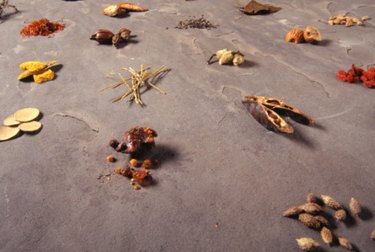
Interstitial cystitis, or IC — also known as painful bladder syndrome — is a chronic inflammation of your bladder wall. IC causes chronic pain in your pelvic area, pain when urinating, and a sense of urinary urgency and frequency. Doctors don't know exactly what causes IC, but believe it may be due to stress, anxiety, an autoimmune disorder, excessive histamine release, a leaky bladder lining or damage to nerves in the bladder. Conventional treatment may include antihistamines, antidepressants and pain medication. Herbal teas may help relieve symptoms of IC naturally. Consult your health care provider before starting herbal treatment.
Herbal Actions
Video of the Day
Herbal teas for IC work in different ways. Anti-inflammatory herbs aim to reduce the inflammation and damage to the bladder wall. Nervine muscle relaxants ease tense pelvic muscles that trigger pelvic and bladder pain. Antidepressant herbs reduce inflammation and pain in the nerves in your bladder. Check with a qualified practitioner for advice about dosage and preparation of herbal teas for IC.
Video of the Day
Evening Primrose
Evening primrose, or Oenothera biennis, is a fragrant North American herb with yellow flowers. The seeds are rich in volatile oil containing gamma-linolenic acid, or GLA. Herbalists use the oil to treat skin disorders, irritable bowel syndrome, rheumatism and circulatory disorders. In his 2001 book, "The One Earth Herbal Sourcebook," herbalist and Asian medicine specialist Alan Keith Tillotson, Ph.D., D. Ay., advises using evening primrose oil to reduce inflammation from IC and heal the mucous membranes in your bladder wall. Internal use of this herb may cause gas.
Kava
Kava, or Piper methysticum, is an evergreen woody shrub native to Polynesia. Traditional healers use the roots and rhizomes to treat anxiety, stress and insomnia. In their 2009 book, "Medicinal Plants of the World," botanist Ben-Erik van Wyk and biologist Michael Wink explain that kava is rich in chemicals called kavalactones, which bind to brain receptors and produce a calming and analgesic effect. Herbalist Alan Keith Tillotson recommends kava for IC to reduce tension and pain in the bladder. Follow the advice of your practitioner regarding use and dose, since kava may be toxic in high doses over a long period.
St John’s Wort
St. John's wort, or Hypericum perforatum, is a European perennial with tiny yellow flowers. Historically it's a remedy for healing wounds, but herbalists also use the flowers to treat anxiety, nervous conditions and mild depression. Stress reduction is vital in healing IC, and natural antidepressants may help heal inflamed nerves and tissues in your bladder. In his 2003 book, "Medical Herbalism: The Science and Practice of Herbal Medicine," clinical herbalist David Hoffmann recommends St. John's wort to reduce inflammation, relieve nerve pain, and reduce anxiety and tension. Do not combine this herb with other antidepressants.